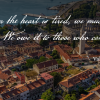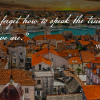
Published: August 31, 1999
View the Original Newsletter: Iskra-41.pdf
About This Issue
Iskra No. 41 is a reflective and unapologetically honest issue that confronts political hypocrisy, social indifference, and the dangers of silence — both in Croatia and abroad. Through Valentina Krčmar’s thought-provoking essays, letters, and cultural highlights, the issue explores the tension between truth-telling and self-censorship in a society still recovering from war. It also celebrates Croatian resilience, art, and community achievements while warning of the moral decay that comes from complacency.
Motrišta: “The Weight of Words”
In her opening essay, Valentina Krčmar revisits a personal story from the early 1990s when she and her colleagues at Bedem Ljubavi (Mothers for Peace) faced hostility for speaking openly about the plight of Croatian soldiers and civilians. She reflects on how speaking truth to power came with a cost — ridicule, accusations, and isolation — yet insists that silence would have been the greater betrayal.
“To remain silent while others distort your truth,” she writes, “is to give them permission to bury it.”
Krčmar challenges readers to reclaim their moral courage, warning that postwar comfort has led too many to forget the collective responsibility to uphold truth. She calls on Croatians to remember that freedom of speech is not only a right but a duty — one earned by those who sacrificed their lives for the homeland.
Her essay ends with a pointed reflection on the modern media climate: “When newspapers and television become tools of convenience rather than conviction, democracy begins to die quietly.”
From the Editor’s Desk
Valentina opens with commentary on the recent Hague Tribunal hearings and the international media’s portrayal of Croatian generals. She condemns the double standards applied to Croatia compared to Serbia and Bosnia, questioning why the world seems so quick to forget the aggressors’ crimes while scrutinizing the victims’ defense.
She writes, “We will cooperate with justice — but we will not allow justice to be rewritten by those who never cared to understand us.”
The editorial also celebrates small victories in community life, including a growing readership across North America and heartfelt letters from subscribers who describe Iskra as their “bridge to home.”
News from Croatia
-
Tuđman’s Health and Speculation — Reports circulate about President Franjo Tuđman’s declining health, though officials insist he continues to fulfill his duties.
-
Election Season Approaches — Political parties prepare for the upcoming elections; opposition leaders call for fair media access and transparency.
-
Hague Tribunal Updates — New indictments are rumored against Croatian officers, while Belgrade remains defiant over surrendering suspects.
-
Infrastructure and Recovery — Progress continues on housing reconstruction in war-affected areas, though funding remains inconsistent.
-
Tourism Results Mixed — Despite record numbers in July, criticism mounts over lack of service standards and marketing strategy.
Diaspora Voices and Community News
The issue features several letters from Croatian-Canadians reflecting on community life abroad. A Toronto reader praises local parishes for preserving culture among youth, while another laments the divisions that still persist among Croatian organizations: “If we cannot unite abroad, how can we expect harmony at home?”
Krčmar responds with optimism, highlighting examples of cooperation — such as joint cultural festivals and charity events — as signs of hope for greater unity.
Culture and Heritage
“The Power of the Pen”
A feature article celebrates Croatian writers and journalists who used their words as weapons during the Homeland War. The piece profiles authors like Ante Matić and Slaven Letica, whose courage to publish under censorship inspired countless others to speak freely.
“A Cathedral Restored”
An illustrated piece marks the reopening of Đakovo Cathedral, restored after years of careful conservation. It’s praised as a symbol of endurance and a reminder that beauty, like truth, must be protected.
“From Canvas to Conscience”
A review of painter Ivan Lacković Croata’s exhibition in Zagreb highlights his focus on rural life and the dignity of ordinary people. Critics call his work “an unspoken hymn to the Croatian soul.”
Health and Wellness
A wellness column explores the psychological toll of long-term stress, emphasizing the importance of rest, prayer, and family connection. It offers simple breathing and meditation exercises rooted in traditional Christian mindfulness, blending faith with self-care.
Humor and Reflection
The Svaštice section delivers comic relief through witty one-liners and anecdotes about family life, bureaucracy, and modern technology. One reader jokes, “Croatians invented multitasking — we can argue, cook, and fix the TV antenna all at once.”
Closing Thought
Iskra No. 41 is both a confession and a call to conscience. Through her unmistakable voice, Valentina Krčmar urges Croatians everywhere to remember that words carry weight — they can heal, divide, or awaken. The issue stands as a testament to the belief that truth, even when inconvenient, is the highest form of patriotism.




